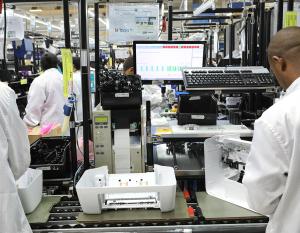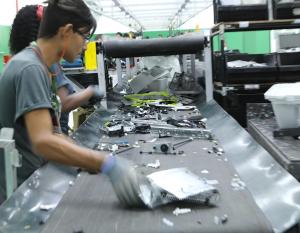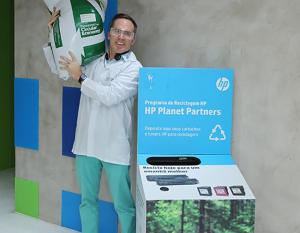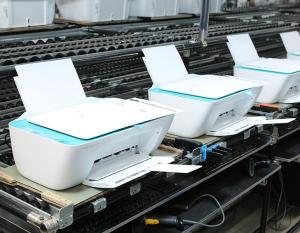A Sao Paulo Factory Is Pioneering Zero-Waste Manufacturing and Closing the Loop with Plastics
The facility, located in a large industrial park called Flextronics International Tecnologia Ltda. on the western edge of São Paulo, is zero-waste: Nothing used in the plant ends up in a landfill. This innovative and sustainable manufacturing process also includes an adjacent recycling center supplied by the local HP Planet Partners program and also from a new initiative with community groups which collect waste to use in new products.
Eventually, HP envisions teaming up with organized cooperatives and independent collectors to increase supplies of recycled plastic not just in Brazil, where more than a million people work as informal waste-collectors, but also in India, South Africa and beyond. Those relationships should help accelerate efforts to reduce HP’s environmental footprint and bring the company closer to its goal of recycling 1.2 million tons of hardware and supplies around the world by 2025.
“Once we understand how the model works and pass the pilot phase, we want to leverage that experience,” says Paloma Cavalcanti, HP’s sustainability country manager for Brazil and Argentina. “We are saving money and we are multiplying jobs. It’s a completely win-win system.”
Closing the loop from a product’s birth to rebirth
The manufacturing, recycling and research buildings at the São Paulo site for form a literal — if rectangular — loop. It’s a shift away from a traditional linear supply chain, which takes resources from the Earth to make products that are ultimately discarded. Instead, the goal is to adopt a circular model that uses and reuses materials with minimal waste.
HP’s operations in Brazil take the idea one step further, creating a closed-loop system that turns waste directly into new products. “It’s all about keeping materials in motion for as long as possible,” says Randi Braunwalder, HP’s manager of social & environmental responsibility in the Americas. “Continuous life cycles instead of limited lifespans.”
Just a few minutes away by car from the manufacturing facility is the HP Recycling Center. Operated by Sinctronics, a Flex Brazilian business unit that specializes in electronics recycling, the facility is a flurry of reverse manufacturing. Here, employees in lab glasses and work gloves deconstruct laptops and other equipment. Then, they sort parts by materials with help from sensors that can distinguish between types of plastic that look identical to human eyes. Machines mix, melt, extrude and cut plastic into tiny pellets — the raw material of new products.
Between the manufacturing and recycling buildings sits an R&D lab, where researchers are looking for new ways to enhance the closed-loop process. One line of research focuses on RFID tags, which HP embeds into every product. Among other uses, the electronic tags allow the recycling plant to identify incoming materials more efficiently than they could by hand, which speeds up sorting and recycling tasks. Research is also ongoing to create 3D printing technologies that could build printers and other products while eliminating manufacturing waste altogether.
In the meantime, the lab remains a hot spot for recycling innovations. In other parts of the world, visiting each step of a circular economy can require crossing international borders, which hampers efficiency and discovery, says Kami Saidi, HP Latin America supply chain director. Over the last several years, the collaboration between HP and Sinctronics in Brazil has led to new techniques for producing recycled plastic that is durable and aesthetically acceptable to customers, matching the color and feel of products they are used to.
The team has also tackled the problem of making recycled white plastic, which poses a particular challenge — even a tiny amount of contamination tarnishes the color. Because the team at HP-Brazil can build, melt and rebuild parts in one location, they have been able to invent a 45-step process for manufacturing recycled white plastic — the first of its kind.
“It is important to have all these guys under the same roof. It’s a very fast feedback loop,” Saidi says. “With separate companies, it would take years.”
An epicenter for sustainability innovation
A circular approach to product development has been gaining momentum across HP operations worldwide. In 2016, the company began collecting plastic bottles in Haiti and turning them into parts for Original HP ink cartridges — a project that has created jobs and kept more than half a million pounds of plastic out of the ocean. More than 80 percent of HP ink cartridges and 100 percent of HP LaserJet toner cartridges worldwide are now produced with at least some recycled plastic from a closed-loop system. HP is also using recycled plastic to make new printers, including the HP Tango Printer, introduced in 2018, which incorporates more than 30 percent closed-loop plastic.
Brazil has become a proving ground for HP’s sustainability efforts, in part because the country faces massive pollution problems, says Nate Hurst, HP’s chief sustainability and social impact officer. The city of São Paulo, alone, generates 20,000 tons of waste each day. Already a hub of manufacturing and innovation, HP-Brazil has everything it needs to close the circle from a product’s birth to its rebirth — all in one place.
Community collaboration
HP-Brazil’s sustainability successes also hinge on decades of trust-building in the region, which now includes a partnership with 44 members of the Coopernova cooperative in Jardim Nova Cotia, a hilly neighborhood on the outskirts of São Paulo; and Coopertech, another cooperative in São José dos Campos near São Paulo. For nearly two decades, Coopernova has gathered materials to sell to brokers for resale — a load that includes trashed computers, vacuum cleaners and other electronic waste.
Beginning in early 2018, HP’s Brazilian headquarters offered the cooperatives a deal: HP would buy every piece of e-waste the group collected — setting the company apart from brokers, who buy only what they want and leave collectors to deal with the costs of disposing what is left. HP would pay a premium for e-waste by the kilogram, ensuring that cooperative members would get steady income at a higher rate than what they would otherwise earn. In addition, the cooperatives benefit from training and management consulting from HP, with the ultimate goal of having their operations meet the SA800 certification standard for factories.
For HP, cutting out the brokers would also eliminate an extra layer of inefficiency and unpredictability in their incoming stream of materials, while reducing exploitation of collectors. The cooperative signed on and so far, HP has acquired more than 32 tons of e-waste from the cooperatives — material that would otherwise have ended up with scrap dealers and in landfills.
Good for business and the community
Relationships with cooperatives are helping accelerate an already booming sustainability initiative in Brazil. Since 2012, HP-Brazil has collected and recycled more than 5,000 tons of end-of-life HP products and manufactured more than 8.2 million printers with recycled content. In 2018, the HP Ink Tango printermanufactured in Brazil contained 20 percent recycled plastic, and the company is working to get that number up to 32 percent by 2020.
Goals like these are motivated by more than just concern about an increasingly stressed planet. What’s good for the environment can also be good business, Hurst says. Customers increasingly want to buy from companies that protect the environment. And sustainable practices often save money. With closed-loop recycling, HP-Brazil spends up to 32 percent less than it costs to use virgin plastic. “We can grow the business and protect the environment,” Hurst says. “It’s not one or the other.”
Local communities can benefit, too. A few times a year, HP-Brazil and Sinctronics invite schoolchildren from the São Paulo area to visit the plant and learn about its operations. The goal: to make recycling seem normal, and preferable, to throwing things away. That’s something that Claudio Raupp , HP’s managing director in Brazil, says he never experienced while growing up in southern Brazil.
Today, Raupp says he sees a growing emphasis on getting everyone involved in taking care of the environment together. “It’s not just about the company — it’s not just one single piece of the puzzle,” he says. “It has to be the citizens, the students, the government, ourselves, our competitors, and our partners. Otherwise it is just an empty infrastructure.”
In Jardim Nova Cotia, for example, HP’s budding relationship with the cooperative of waste collectors illustrates the potential for business practices to integrate environmental stewardship with social innovation, while boosting the livelihoods of local partners — offering something for everyone.
“I consider waste valuable,” says Renilda, one cooperative member who recently visited HP-Brazil operations. “If you look at it in a positive way, you can make money from it and save the planet, as well.”
See how HP’s closed-loop recycling program is helping rebuild lives in a Los Angeles community.
















